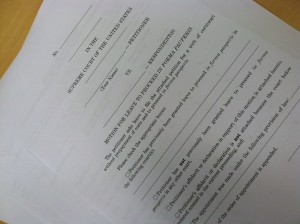Many of the petitions filed in the U.S. Supreme Court each term are filed by prisoners representing themselves. And most of these prisoner pro se petitions are filed on the Court’s in forma pauperis
 When the Justices review the petition in conference, they will first examine the IFP application to determine whether or not the filing fee and booklet formatting requirements should be waived for the petitioner. If they grant the IFP application, they will then review the briefs and decide whether or not to grant the petition. If the Justices deny the IFP application, the petitioner will have 21 days to re-file the petition in booklet form and pay the docketing fee. (My colleague Mathew Planalp describes the re-do process in his post.)
When the Justices review the petition in conference, they will first examine the IFP application to determine whether or not the filing fee and booklet formatting requirements should be waived for the petitioner. If they grant the IFP application, they will then review the briefs and decide whether or not to grant the petition. If the Justices deny the IFP application, the petitioner will have 21 days to re-file the petition in booklet form and pay the docketing fee. (My colleague Mathew Planalp describes the re-do process in his post.)
Pro Se Help For the IFP Prisoner
Prisoner filers can find pro se help for their IFP filings on the Court’s website. There, the Court offers its Guide For Prospective Indigent Petitioners For Writs Of Certiorari. This document includes a short review of the filing process, a concise description of the petition requirements, and simple forms for pro se filers to use when filing.
Because pro se filers are not subject to the strict formatting requirements of Rule 33.1, the prisoner can prepare the petition using the Court’s fill-in-the-blank form. Similarly, The Guide offers a fill-in IFP application and affidavit.
Of course, prisoners are not prohibited from filing paid booklet petitions. Cockle Legal Briefs often works with inmates to proof, print and file their petitions. But if you need pro se help filing your IFP petition, check out the Court’s website.
